SALT LAKE CITY — From a young age, Luz Escamilla already knew firsthand what disparity looked like.
She knew she was fortunate — growing up in Mexico with two parents who were the first in their families to go to college.
But poverty still surrounded her. At 15, Escamilla said she started teaching literacy to adults who still didn’t know how to read or write. She said she would also collect toys and clothes from her friends to bring to the orphanages.
“That was my only sense of doing something because it was devastating to see so much poverty,” Escamilla said.
Escamilla, now 41, was born in Mexico City, but grew up in many places in the northern states of Mexico. Her parents were from Torreón in the Mexican state of Coahuila, a city of industrial development in a desert of two extremes, cold winters and blistering hot summers.
She doesn’t consider her childhood to be “anything special,” except for perhaps growing up in a neighborhood so close to her cousins and her grandmother from her mother’s side. Many of those cousins, like her, would grow up to earn college degrees. Some would become doctors. Others, engineers.
And Escamilla — she’d grow up to become a Utah state senator.
Now, she’s running to become mayor of Utah’s capital city. If she wins, she’ll become Salt Lake City’s first Latina mayor — and the first mayor to come from the city’s west side, an area known for income and educational disparity. She lives in Rose Park.
Her supporters laud her as a “champion” for minorities, but Escamilla doesn’t want where she was born or her ethnicity to be the only things that define her. Rather, she hopes people see her as a product of her experience, in the public and private sectors, to understand what she stands for.
“It’s the intersectionality of the different backgrounds and experiences that make me who I am,” Escamilla told the Deseret News in a recent interview in her campaign offices at a storefront on Harvey Milk Boulevard.
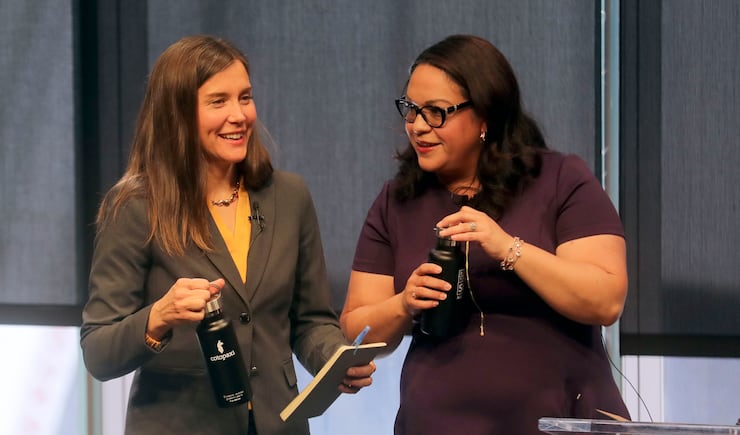
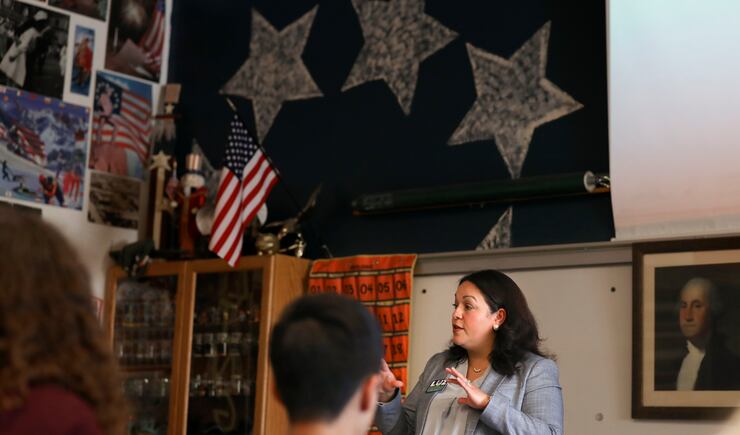
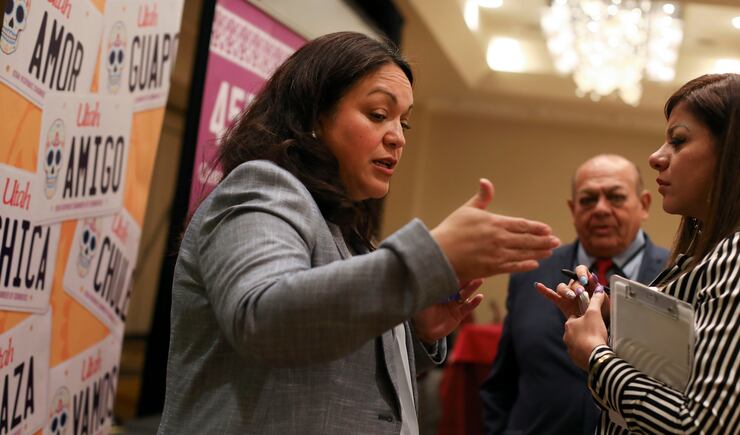
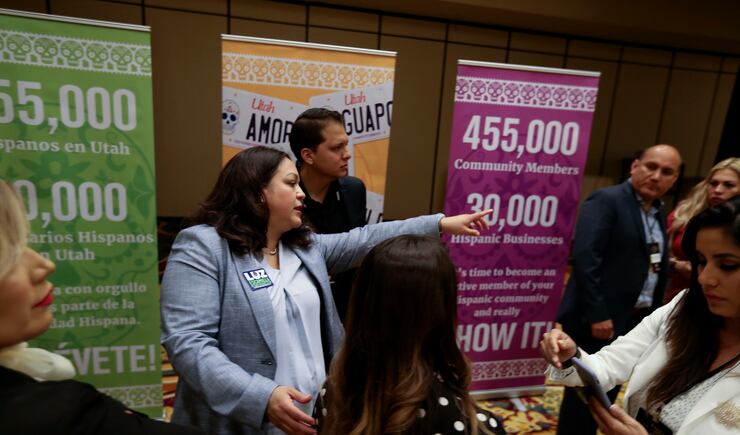

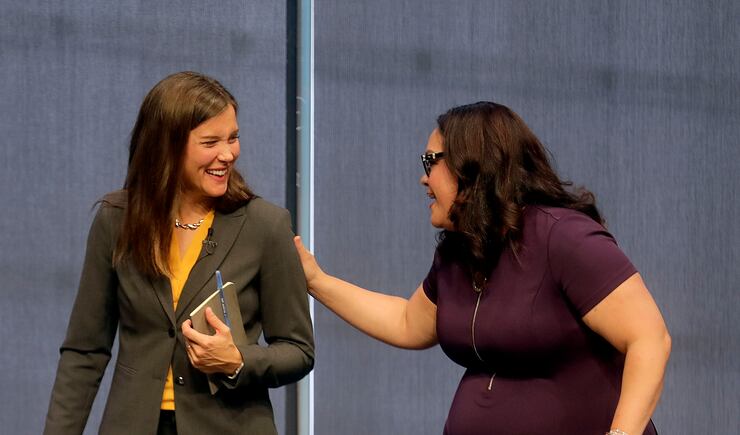
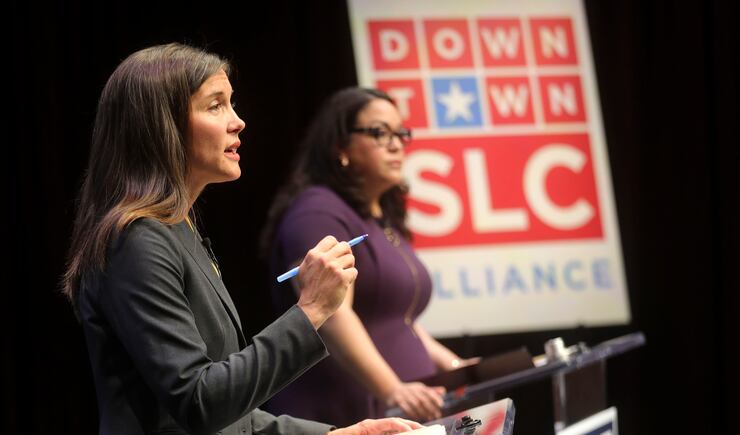
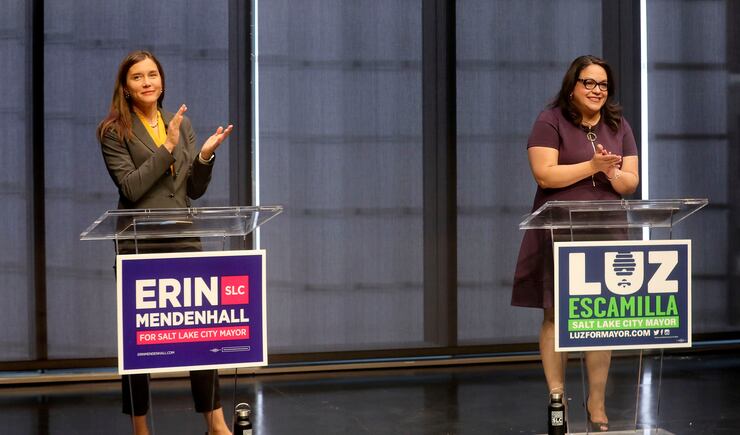
Escamilla said she never set goals or milestones for herself that would intentionally lead to her politics, but rather she says her life has been a natural progression that would eventually steer her to public office. What did drive her, she said, was her hope for change.
“It’s how I handled my concerns, my frustrations, with issues related to achievement gaps that got me engaged,” Escamilla said.
She says it’s her passion to elevate equitable opportunities for underserved communities that has her pushed her to run as a Democrat in Utah’s GOP-dominated Legislature and now her efforts to become Salt Lake City’s next mayor.
From 12 years as an executive for Zions Bank focused on helping small businesses, to experience in multiple nonprofits focused on issues ranging from domestic violence to health policy, to being appointed by Republican Gov. Jon Huntsman Jr. as the director of the State Office of Ethnic Affairs, Escamilla says it’s her experience in private and public sectors — including legislative and administrative branches — that qualifies her to be the next CEO of Salt Lake City.
“I think my experience speaks for itself,” Escamilla said.
From a family who ‘sacrificed’ for the ‘American dream’
Education was a hallmark of Escamilla’s upbringing.
Her mother was a chemical engineer. Her father, who also had an engineering degree, worked in banking for 20 years. Both of them taught as engineering professors in Mexican universities.
“Education was kind of the way in our family to close cycles of poverty,” Escamilla.
While Escamilla credits her parents for prioritizing education, there’s another character who played a big role in her life, who she said inspired a natural tendency for public service.
It was her grandmother, Socorro Romo, who gave Escamilla her first experiences with politics.
Escamilla recalled when she was 12 or 13, one of her first memories with her grandmother was helping her campaign for a position in the state legislature. She wasn’t successful, Escamilla said.
“I asked her, ‘Why are you doing this?’” Escamilla recounted, noting Mexican politics was a difficult arena. But she said it was her grandmother’s desire to have parks and open space for her children that pushed her to “be part of the conversation and be engaged.”
“My grandmother was the bomb. She was strong, determined. ... Really, the matriarch for our family,” Escamilla said, telling of how she owned a business in construction despite it being a male-dominated trade.
From her grandmother to her parents, Escamilla said she was raised “surrounded by strong, determined women” who showed her what was possible, and a father who prioritized education, making “huge sacrifices” to make sure she and her brother, Mario, grew up with quality schooling.
Escamilla’s parents also raised her in a culture of faith. She said her parents were always involved in the community as members of The Church of Jesus Christ of Latter-day Saints — though she also grew up around other faiths. She said her grandmother was the first to become a Latter-day Saint, but the other half of her family was Catholic.
It was her father, Escamilla said, who helped her in her first political endeavor: running for student body president in middle school. He helped her with her logo and campaign, but she lost by five votes.
“Five votes was brutal,” Escamilla said, chuckling.
As they grew older, her parents moved to Tijuana and encouraged Escamilla and her brother to finish their education in the U.S.
Their family lived the “border life,” Escamilla said. For the last two years of high school, she crossed the border every day, commuting back and forth from Tijuana to go to school in San Diego.
As a high schooler, Escamilla said, waking up early every day to cross the border was just part of life. But now, as a mother, she said she realizes the “sacrifices” her parents made every morning, sending her and her brother out the door, only with faith they’d stay safe.
Escamilla said she still remembers the image of her dad standing at the door at 6 a.m., watching them leave for school.
“It was just a daily routine,” Escamilla said. “It was part of the sacrifices of living across the border.”
After graduating high school, Escamilla moved to Utah as an international student seeking the “American dream,” she said, eventually graduating with a bachelor’s in business marketing from the University of Utah. Later, Escamilla would go on to earn her master’s in public administration.
After graduating, Escamilla got her work visa and in 2004 she became a U.S. citizen. She and her husband, Juan Carlos Escamilla, have six children, including two adult children who live in Arizona. At home, they care for Juan Carlos, 15, Aileen, 14, Sol, 4, and Cielo, 3.
At times as Escamilla speaks, she pauses to cough. She apologizes, explaining it’s her asthma, which she said has been aggravated by the Wasatch Front’s air quality. She said her daughter, Cielo, also suffers from asthma, and it’s why she has a personal interest in prioritizing air quality initiatives — for both her family, and west-side communities, which she says are disproportionately impacted by pollution.
“It breaks my heart,” Escamilla said, noting Cielo has medication and oxygen treatments to deal with her asthma. “I don’t want that for her, but I love Salt Lake City. I want her to enjoy what I’ve been blessed with.”
Just last year, Escamilla said, she reached a personal turning point when her father died suddenly of a rare respiratory lung condition that she said was “complicated” by Salt Lake City air. He was 65 when he died.
“That really plateaued everything,” Escamilla said, explaining it caused her to “pause” and think about her life, “putting things in perspective” about what she wanted to achieve.
On the campaign trail
As Escamilla explored the hallways of West High School — popping in and out of a handful of classrooms alongside Principal Ford White and Salt Lake City School District Superintendent Alexa Cunningham — she seemed to be somewhat of a celebrity to some of the students there.
“Oh, is that Luz?” one student gasped as Escamilla walked in to her classroom, putting her hands over her mouth.
Escamilla said her son Juan Carlos attends West High, and she joked about not wanting to embarrass him by unexpectedly visiting any of their classrooms.
Mingling in the hallways with students — many residents of Salt Lake City’s west side with diverse ethnic backgrounds — Escamilla switched back and forth between speaking Spanish and English.
In the classrooms, Escamilla gave students a brief overview of why she’s running for mayor, telling about her passion for education, wanting to close achievement gaps for kids especially from the city’s west side, and promising to work with district officials to bring nurses and counselors to help address suicide rates and gun violence.
When one student asked her why she was speaking to them when they weren’t even old enough to vote yet, Escamilla smiled, pointing out their parents could vote, and said that she cares “deeply” about ensuring students have quality education.
“To me, listening to you guys is important,” Escamilla said. “You guys know the world in a very different way.”
After fielding more questions — ranging from how she would improve public transportation access so they could get to school easier or how she would help students improve access to trained mental health professionals — Escamilla walked to another classroom smiling.
“I just love kids, they’re just more real,” Escamilla said. “It gives me hope.”
A ‘powerhouse’ for building bridges
When Rep. Angela Romero first met Escamilla back when they both attended the University of Utah, Romero said her first impression was of a “strong” but also “level-headed” person, which was a good balance to Romero, who described herself as “more radical” Democrat.
“Whenever I wanted to push it to the next level, she would make me evaluate and think about both sides of the issue and find the commonalities without compromising what you believe in and who you are,” Romero said.
Escamilla and Romero — along with several other women who would go on to become elected Democrats in the Utah Legislature — all got to know each other at the U. through student groups focused on ethnicity and race equality, volunteering together for various causes, Romero said.
While she studied at the U., Escamilla said she recognized achievement gaps while tutoring students, many of whom were children of immigrant parents.
“That really started opening my eyes to all of the disparities and gaps and how the ZIP code where you live has social detriments,” Escamilla said.
As Romero has watched Escamilla progress in both her professional and political career, she said she’s come to truly appreciate her “personal story” as someone who came to the U.S. as a student, and an “immigrant who was embraced by the city.”
“She symbolizes that hope,” Romero said. “Many people within our current political climate feel hopeless. So her as mayor would be a reflection of our changing demographics and bringing the city together.”
Romero said she’s watched Escamilla gracefully embrace being a mother, working a full-time job, and working as a legislator in Senate leadership while finding common ground with GOP counterparts.
“I have so much respect for her, and I know both sides of the aisle have the respect for her as well,” Romero said. “She’s just a powerhouse up here.”
At around the same time her father died last year, Escamilla said more and more people were beginning to ask her if she planned to run for mayor. And when Salt Lake City Mayor Jackie Biskupski withdrew, Escamilla said she really started to ask herself, ‘What do I personally think I can bring to the city?”
“It was really an ‘aha’ moment for me,” Escamilla said. “If we have a different style in how we work with the state and we have an opportunity to really make this strong capital city, then we could be even stronger than we are and have the buy-in from the whole state.”
Her relationships and track record on Capitol Hill has been a pillar of Escamilla’s campaign. Throughout her 11 years in the Senate, she’s passed legislation in issues related to air quality, health care, public education, after-school programs and more. She fought for Medicaid expansion. She also passed a bill to establish monitoring facilities to measure the environmental impact of the Utah Inland Port development on about 16,000 acres west of the airport.
Escamilla says Salt Lake City is currently too siloed from the state and would benefit from a better relationship with state leaders — and that’s what she intends to bring to the mayor’s office. She said she believes the “needle can move” on big issues because she believes in “incrementalism” and finding common ground.
“How cool would it be to have this super strong Salt Lake City coalition that includes your elected legislators,” Escamilla said. “I think that will just change the conversation. Look, are we going to agree with the rest of the state on everything? No. Our values are different, but we have commonalities.”
Correction: An earlier version of this story incorrectly stated both of Escamilla’s teenagers attend West High School. Only Juan Carlos does.










